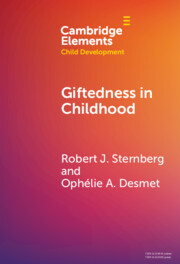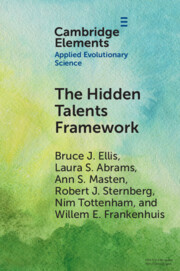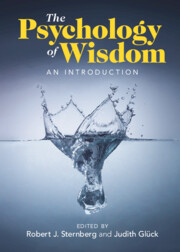702 results

Giftedness in Childhood
-
- Published online:
- 02 December 2023
- Print publication:
- 18 January 2024
-
- Element
- Export citation

The Hidden Talents Framework
- Implications for Science, Policy, and Practice
-
- Published online:
- 24 March 2023
- Print publication:
- 06 April 2023
-
- Element
- Export citation
29 - The Job Search
- from Part VI - Your Career After Graduate School
-
-
- Book:
- The Portable Mentor
- Published online:
- 21 July 2022
- Print publication:
- 04 August 2022, pp 546-564
-
- Chapter
- Export citation
Chapter 1 - Introduction
- from Part I - Introduction to Wisdom Theory and Research
-
-
- Book:
- The Psychology of Wisdom
- Published online:
- 26 May 2022
- Print publication:
- 09 June 2022, pp 3-14
-
- Chapter
- Export citation
Part I - Introduction to Wisdom Theory and Research
-
- Book:
- The Psychology of Wisdom
- Published online:
- 26 May 2022
- Print publication:
- 09 June 2022, pp 1-104
-
- Chapter
- Export citation
Contributors
-
- Book:
- The Psychology of Wisdom
- Published online:
- 26 May 2022
- Print publication:
- 09 June 2022, pp ix-x
-
- Chapter
- Export citation
Index
-
- Book:
- The Psychology of Wisdom
- Published online:
- 26 May 2022
- Print publication:
- 09 June 2022, pp 262-270
-
- Chapter
- Export citation
Figures
-
- Book:
- The Psychology of Wisdom
- Published online:
- 26 May 2022
- Print publication:
- 09 June 2022, pp vii-vii
-
- Chapter
- Export citation
Contents
-
- Book:
- The Psychology of Wisdom
- Published online:
- 26 May 2022
- Print publication:
- 09 June 2022, pp v-vi
-
- Chapter
- Export citation
Part III - The Modifiability of Wisdom
-
- Book:
- The Psychology of Wisdom
- Published online:
- 26 May 2022
- Print publication:
- 09 June 2022, pp 173-208
-
- Chapter
- Export citation
Copyright page
-
- Book:
- The Psychology of Wisdom
- Published online:
- 26 May 2022
- Print publication:
- 09 June 2022, pp iv-iv
-
- Chapter
- Export citation
Preface
-
- Book:
- The Psychology of Wisdom
- Published online:
- 26 May 2022
- Print publication:
- 09 June 2022, pp xi-xvi
-
- Chapter
- Export citation
Part II - Foundations of Wisdom in the Individual and in the World
-
- Book:
- The Psychology of Wisdom
- Published online:
- 26 May 2022
- Print publication:
- 09 June 2022, pp 105-172
-
- Chapter
- Export citation
Tables
-
- Book:
- The Psychology of Wisdom
- Published online:
- 26 May 2022
- Print publication:
- 09 June 2022, pp viii-viii
-
- Chapter
- Export citation
Part IV - Wisdom in the World
-
- Book:
- The Psychology of Wisdom
- Published online:
- 26 May 2022
- Print publication:
- 09 June 2022, pp 209-261
-
- Chapter
- Export citation
Chapter 4 - Psychological Theories of Wisdom
- from Part I - Introduction to Wisdom Theory and Research
-
-
- Book:
- The Psychology of Wisdom
- Published online:
- 26 May 2022
- Print publication:
- 09 June 2022, pp 53-69
-
- Chapter
- Export citation
Chapter 8 - Wisdom, Morality, and Ethics
- from Part II - Foundations of Wisdom in the Individual and in the World
-
-
- Book:
- The Psychology of Wisdom
- Published online:
- 26 May 2022
- Print publication:
- 09 June 2022, pp 118-134
-
- Chapter
- Export citation

The Psychology of Wisdom
- An Introduction
-
- Published online:
- 26 May 2022
- Print publication:
- 09 June 2022
6 - How Do We Cultivate Wisdom?
-
- Book:
- Wisdom
- Published online:
- 07 October 2021
- Print publication:
- 28 October 2021, pp 128-147
-
- Chapter
- Export citation
Epilogue
-
- Book:
- Wisdom
- Published online:
- 07 October 2021
- Print publication:
- 28 October 2021, pp 189-192
-
- Chapter
- Export citation



